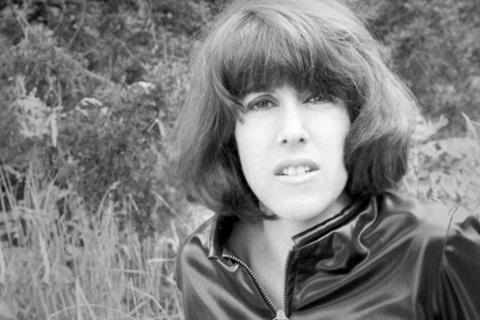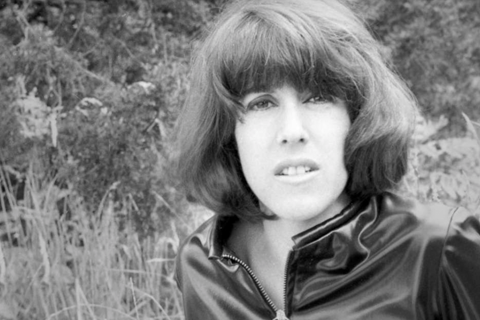Sign up to stay in the loop on new styles and sales!
Sign up to stay in the loop on new styles and sales!
The Most Biased Review You'll Ever Read (re: 'Everything is Copy,' the Nora Ephron doc)
thinx archive
·5 min read

by Kelsey Duchesne | 03/24/2016
I will start by clarifying that this will not be an unbiased review of the Nora Ephron documentary, Everything is Copy__. I loved it. I have watched it twice and will force friends to watch it with me while I eagerly soak up their reactions. It was everything I wanted. It made me laugh and it made me cry, just as her films did. It gave me goosebumps, just as her essays did. It was perfect to me.
As a dedicated Ephron reader and romantic-comedy enthusiast, I didn’t even attempt to separate myself from the 90 minute film, directed by Ephron’s son, journalist Jacob Bernstein. It all felt so satisfyingly personal, as everything about Nora’s writing did. In the beginning of the film, Ephron’s longtime editor and friend Bob Gottlieb says “I think for many women she became a feminist icon. She broke through a lot of glass ceilings. That meant a lot to women I know. So it made sense, that for many, many people, her death was personal. People who didn’t know her.” I can confirm that this is entirely true. It has been almost 4 years since Ephron’s death, and to digest fresh content about the writer was such a welcomed treat. It made me feel closer to a woman I will never actually know, but was so truly my friend.
The film, which premiered on HBO on March 21st, is almost entirely faithful to a chronological format, consisting of home footage, clips of Ephron, some of her most iconic pieces read by actors who loved her, and interviews conducted by Bernstein (a highlight is when Steven Spielberg compares making her laugh to winning an Oscar- GOALS, people.) For anyone that loves and cares about Ephron as much as I do, this documentary will go down like ice cream- you will intently devour every bite. For Ephron newcomers, it will be a wonderful way to get to know an incredible woman, writer, and icon. Every woman should know Nora Ephron. Every journalist, screenwriter, and New Yorker should know Nora Ephron. Anyone who loves to cook, or maybe just loves the taste of butter, should know Nora Ephron, and take her advice on how to properly cook a steak. This documentary is an opportunity to discover a new dimension of Ephron- stories and information that she can’t influence or control. Trust me- it only makes you love her more.
Ephron’s family and close friends talked about sides of Nora I’ve never gotten to know through her writing. How she was deeply intimidating, could be difficult to please, and had almost damning high-expectations. The movie touches upon her biggest film flops, a topic Nora covered in her writing but never, ever, went into detail about. How she never told anyone she was sick with leukemia and never wrote about it, even though any other part of her life (and others) was on the record. Reading Nora’s essays creates a relationship where you feel like you know her deeply and personally, to the point where she feels like a close personal friend. When I first moved to New York (a decision she would have strongly encouraged), I always kept one of her books in my backpack and read it when I felt alone or questioning my decision. Ephron promised me that I would fall in love with New York, and naturally, she was right. Nora has felt like a confidant for so long that hearing her actual friends and family describe their relationships with her felt so incredibly special.
Ephron was a fearless writer. She wrote in first person as a reporter, even when she was covering murders, a job she thoroughly enjoyed. She wrote about being a feminist while still enjoying things that may not be considered so, like taboo sexual fantasies and believing in the power of destiny and true love. She wrote about her personal love and loss, and her recurring thoughts about death. In her screenplays, she was so fluidly able to create engrossing romantic relationships between men and women (most specifically, Tom & Meg/Billy & Meg/literally anyone and Meg.) The film gives you an insight into her creating what many people (at least myself and Mindy Kaling) call the perfect romantic comedy: When Harry Met Sally. Rob Reiner recalls the process of Ephon creating the two central characters and how she set them up for one of the most important and iconic romantic declarations of all time (the new year's scene, obviously, and I cry every damn time.) Although Ephron was the master of writing as herself, her character development and dialogue solidified When Harry Met Sally as one of the greatest romantic comedies of all time (many many people believe this, but it is important for me to reiterate: of. all. time).
One of the interviews I was most curious about was Bernstein interview with his father, famed watergate reporter Carl Bernstein. The interview covers Carl Bernstein's infidelity, their public divorce, and Ephron’s semi-autobiographical novel Heartburn, which eventually became a film starring Meryl Streep and Jack Nicholson. After reading Ephron’s personal recollection for so long, it was interesting to see her ex-husbands perspective. In one painfully honest moment, Bernstein says to his son “I thought (Heartburn) would really interfere with how you regarded your father.” “For a while it did.” Jacob replied. It is a quiet and honest moment, as the two men sit with a mutual understanding of the power and influence Ephron’s words had. How she had the capability of controlling the story, even when it stemmed from a place of deceit and unexpected heartbreak. As Jacob summarizes (as he so neatly does throughout the film) Ephron and Bernstein were two people that took up so much space, the heightened drama and passion in their relationship was no exception.

Image by Dan Greenburg/HBO
The documentary focuses intently on the end of Nora’s life, as it came so unexpectedly for almost everyone in her life. Her friends and family discuss the complexities of a woman who so firmly believed that nothing was off limits, anything could be written material,and yes, everything is copy, yet chose to keep her poor health a secret entirely. There are many theories as to why she did this, including a very poignant and astute conclusion by Jacob, but I will leave that for him to explain. Although Ephron was firm that Everything was Copy, as told to her by her mother, friends were left wondering if that was a sentiment that she truly and entirely believed.
I know that this documentary was not only made to bring peace to Nora’s closest family and friends after the blunt finality of her life, but I know it was made for us, too. It was made for the men and women that never knew her, but always felt like they did. Nora Ephron makes me want to be a better and more dedicated writer. She makes me want to be brave. Because of her I am proud to love the romantic comedy genre, and I am so proud to live in New York. As I said before, this is not a review, this is the story of my relationship with a friend I never met. After watching this documentary, I can safely say that I am one of so many people who feel this way about her. If you don’t have a friendship with Nora yet, watch this film, and start with I Feel Bad About My Neck. Your friendship will blossom quickly. Say hello to her for me.
by Kelsey Duchesne


